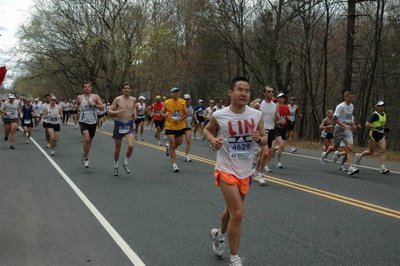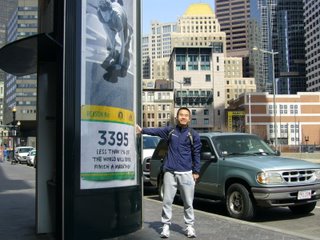
As a rookie for the oldest marathon in the world, I felt small and nervous so that in the Guess_a_thon game in Boston Frontrunner party, I wrote down my projected time: 5 hours. I knew that the injury, which prevented me from running more than 40 minutes pain free on Saturday, would play a wild card on the race day (Monday). Training for a marathon has never been easy, but training in winter is extremely hard. I’ve missed so many key workouts for the two months leading to taper period; only averaged about 20-30 miles a week but still ended in physical therapy.
Essentially, Boston Marathon is a race of egoism. Most people run it just because they’ve qualified. In the expo, there was a giant board which showed all bib numbers and left space for runners to fill in their reasons to run. Mostly, the reasons are: “Because it is Boston” or “Because I can”. It was not a good time to ask a less-motivated runner like me to think of reasons to run: there were many reasons I could come up with but none became important when finishing was as unsure as the weather of springtime in New England. I told Eric to think one for me, and he wrote down in a humble font size: Because Minimax cannot do it. (Note: Minimax is my Siamese cat of one and half years old.)
Race day weather couldn’t be better: 50-55 degree and cloudy. The drive to Hopkinton seemed endless (more than 45 minutes). Once I jumped off the shuttle, I saw a boy sitting in front of a table with a sign: Lemonade 50 cents. Hopkinton was as quiet as a battlefield before a war. The seriousness on faces of runners clouded the small town and made me chilling. I knew it was not appropriate even to speak candidly that to finish was my goal. Here everyone looked like a sub-three-hour runner except those sub-three-hour runners who looked like world record holders.
Essentially, Boston Marathon is a race of egoism. Most people run it just because they’ve qualified. In the expo, there was a giant board which showed all bib numbers and left space for runners to fill in their reasons to run. Mostly, the reasons are: “Because it is Boston” or “Because I can”. It was not a good time to ask a less-motivated runner like me to think of reasons to run: there were many reasons I could come up with but none became important when finishing was as unsure as the weather of springtime in New England. I told Eric to think one for me, and he wrote down in a humble font size: Because Minimax cannot do it. (Note: Minimax is my Siamese cat of one and half years old.)
Race day weather couldn’t be better: 50-55 degree and cloudy. The drive to Hopkinton seemed endless (more than 45 minutes). Once I jumped off the shuttle, I saw a boy sitting in front of a table with a sign: Lemonade 50 cents. Hopkinton was as quiet as a battlefield before a war. The seriousness on faces of runners clouded the small town and made me chilling. I knew it was not appropriate even to speak candidly that to finish was my goal. Here everyone looked like a sub-three-hour runner except those sub-three-hour runners who looked like world record holders.

There was another three hours waiting in the runners’ village. One of the former champions from Africa spoke on stage: “Remember, your half point is not 13.1. It starts from mile 18.” I wish I could have remembered that or have read the article about the course of Boston from Runner’s World magazine one year ago. But what’s the point? I even didn’t have a plan unless you call “run until you cannot” a plan.
Boston course is notoriously tricky in that downhills cause damage so early that runners won’t feel it until killer chain (four uphills in a row) looms out after mile 16.5. I tried to hold my pace in the beginning when so many people dashed out like riding a rollercoaster. The first 10K was fairly easy and I could manage a 7:15 pace. Through half point, I began to feel the fatigue in my legs and gradually slowed down to 7:30 pace. Actually I wasn’t expecting that I could run so fast. It was a miracle that the troubled IT Band and right hip didn’t bother me through the course.
Just after mile 16 (Newton Fall), I encountered the first hill. It was steep enough for me to use it as an excuse for a short walk. I crossed the bridge which is the only one of the two places (the other one is an underpass in Back Bay) where there were no spectators since they were not allowed to stand there. Unfortunately, my walk became more and more frequent as the race went by. My pace slowed down to 8 minutes but I still felt quite strong. Then the course suddenly turns right and the third hill abruptly appeared in front of me. A black guy immediately started to walk and I unwillingly joined him. A woman passed me shouting: keep pounding, power walking, keep pounding, power walking! In fact the third hill was not that bad except quite long (almost one mile), I switched between walking and running several times and proudly managed to run it under 8:30 pace. Just before I could get enough rest from flat, another guy ran by with painful expression: “Go ahead, it IS heartbreak!” I knew the last hill was not long, even not very steep. But having conquered three consecutive uphills, my legs got really tired. It was the time to regroup the runners and unfortunately I was one of those that slowed down tremendously.
According to BAA website, Boston Marathon is the second largest single day sport event second to Superbowl in the world and the estimated 500,000 spectators treated runners like superbowl stars. Through the course, I must have seen all people living in New England. They shouted my name, handed me water, orange, banana, iced sponge. But if there is such a group of spectators that really helped me, it should be awarded to people on Heartbreak hill. I was deafened and touched. My legs didn’t stop at all for the last hill.
No sooner had I claimed Heartbreak than my quadriceps suddenly squeezed together like super-heavy melting iron. I knew immediately something must go wrong with them. I stopped and tried to rub them. People shouted at me: “Don’t stop. All downhills from now on!” Yeah, that’s the beginning of a nightmare when both of legs cramps.
I had to take any chance to stop and massage my legs while not disappointing the crowd. Whenever there was someone handed me water, I took it even though I didn’t drink it. From then on, I changed from run with walk to walk with run. At Boston College, some Chinese girls shouted my name together; I tried to run heroically to pass them but must look like a clown because of my distorted form. Along Beacon Ave, I knew 3 hour 30 minutes was not possible since I was still slowing down. As the bronze medal female winner from Japan later said: Where is the heartbreak? It seems every hill is very tough. The course map didn’t reflect the elevation change for the last four miles, but my leg muscle now could detect any nuance on the ground. I looked miserable and the idea of quitting appeared several times. I asked a guy for water and was told that all he had was beer. Nevertheless I grabbed the beer to pour onto legs. To win their laugh, I drank the rest of beer and saluted to him. All people around began to shout my name like welcoming a hero.
At mile 25, Eric spotted me when I was running like mud. Every step became a torture while the CITGO sign from finish line seemed to be always just one mile away. The last half mile was elevated but sad at the same time. It was overwhelming feeling to be able to muster the last strength from legs to run a few blocks. My final time (3:37) was not really bad, but finishing it in such an ugly way was something I had not expected. In short, I finished the first half in 1 hour 36 minutes while the second half took the toll of more than 2 hours. The last 4 miles costs almost one hour. I have never thought that I could run as slow as 13 minutes per mile before!
 I struggled to get my medal and refused to get on a wheelchair even though I couldn’t walk straight afterwards. Most of the runners around me had the bib number around 8000 which means about 3500 people passed me in the race. Ironically, I didn’t really encounter the wall because I still had energy in tank, but my legs were totally dead due to lack of training.
I struggled to get my medal and refused to get on a wheelchair even though I couldn’t walk straight afterwards. Most of the runners around me had the bib number around 8000 which means about 3500 people passed me in the race. Ironically, I didn’t really encounter the wall because I still had energy in tank, but my legs were totally dead due to lack of training.Sitting here with soreness in legs and bittersweet memory in head, I remember at the start line, a guy carrying a digital camera took pictures of everything he could. He explained that this was his first Boston and would be last one. He had every reason to just enjoy it. Before heading to Boston, I told Eric that I probably would only try Boston once since its noon-start and course elevation change are not good for breaking personal record. But having finished my Boston debut in such a way, I am eager to train for another Boston. Because, I know from my heart, what Heartbreak hill really broke was only my legs, not my heart. I can and will conquer those hills in a victorious way. And I owe all those fantastic spectators who tried so hard to cheer me up when I was sadly walking head down.
As it says, there is no worse form of failure than failure to try. I did try Boston and claimed the medal. And failure is only the opportunity to begin again more intelligently. Next time, I will do it better. I have marked the date of next year’s Boston Marathon down in the calendar.

No comments:
Post a Comment